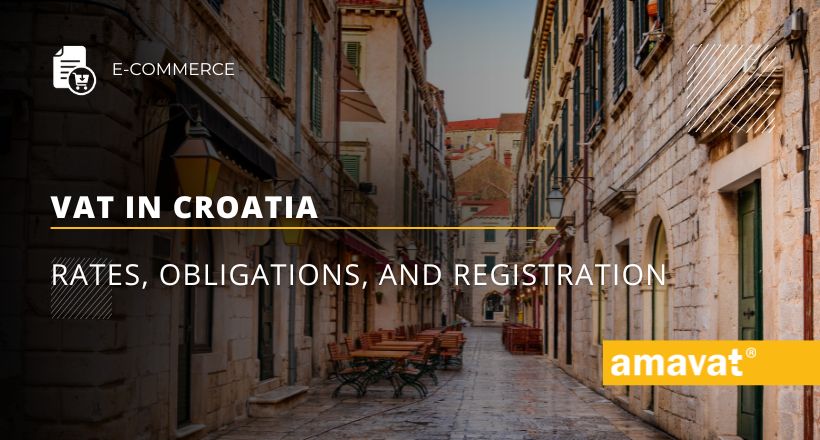VAT in Croatia: Rates, obligations, and registration
Value Added Tax (VAT) is a key component of the tax system in Croatia. Like many other European Union member states, Croatia employs varied VAT rates depending on the type of goods and services. This article will cover the standard and reduced VAT rates, situations where VAT is mandatory, and the procedures for VAT registration, as well as penalties for non-compliance.
Standard VAT rate in Croatia
The standard VAT rate in Croatia is 25%, which applies to most goods and services. This is the highest tax rate, applied to all products and services not subject to reduced VAT rates. In practice, this means that most everyday purchases, such as electronics, clothing, and transportation services, fall under this rate.
Reduced VAT rates in Croatia
Croatia also has two reduced VAT rates: 13% and 5%. Each applies to specific categories of goods and services.
13% VAT Rate
The 13% VAT rate is applied to:
- Foodstuffs (with some exceptions),
- Newspapers and magazines,
- Tickets for cultural events,
- Catering and restaurant services (excluding alcohol),
- Hotel and accommodation services,
- Drinking water and water for agricultural use,
- Electricity.
5% VAT Rate
The 5% VAT rate applies to:
- Certain types of food, such as bread and milk,
- Organic and regional food products,
- Prescription medicines and medical equipment,
- Daily newspapers and scientific magazines,
- Cinema tickets.
0% VAT Rate
Certain passenger transport services are exempt from VAT to promote mobility and the accessibility of public transport.
VAT obligations in Croatia
The obligation to register and pay VAT in Croatia applies to both domestic and foreign businesses operating in the market. For Croatian-based companies, the threshold for mandatory VAT registration is EUR 40,000 in annual turnover. Once this threshold is exceeded, the company must not only register for VAT but also start charging and remitting VAT on all taxable goods and services.
Foreign businesses without a base in Croatia are required to register for VAT regardless of their turnover level. This means that, regardless of sales volume, any foreign company selling goods or services in Croatia must comply with this obligation.
For distance selling to Croatia, there is a special threshold of EUR 10,000 for companies from other EU countries. If the annual value of cross-border sales to Croatia exceeds this threshold, the company must register for VAT. Additionally, if a company stores products in Croatia or participates in an order fulfillment program like Fulfilled-by-Amazon (FBA), it must also register for VAT in Croatia.
VAT registration procedure in Croatia
VAT registration in Croatia requires submitting relevant documents, such as a VAT registration application, an OIB form, translated Croatian registration documents from other EU countries, and an extract from the commercial register. This process typically takes around 4 weeks and should be completed at least 8 days before you start any business requiring VAT registration.
VAT declaration and payment deadlines
VAT declarations must be submitted by the 20th day of the month following the reporting period. Companies can submit declarations monthly or quarterly, depending on their annual turnover.
Penalties for irregularities and delays
Penalties for VAT irregularities can be severe, ranging from HRK 2,000 to 500,000. Additionally, interest on late VAT payments is charged at 12% annually.
Reverse charge mechanism
In Croatia, the reverse charge mechanism is used for domestic supplies of goods and services provided by businesses not registered for VAT in the country. In such cases, the VAT reporting obligation falls on the buyer, provided they are VAT-registered in Croatia.
Intrastat in Croatia
In Croatia, businesses engaged in the trade of goods between EU countries are required to submit Intrastat declarations if their activity exceeds specific thresholds for imports and exports. In 2024, these thresholds are set at EUR 300,000 for exports and EUR 450,000 for imports. Declarations must be submitted by the 15th day of the month following the reporting period.
You can find the Intrastat thresholds and VAT rates for other European countries on our website: Current Intrastat Thresholds and VAT Rates in Europe.
For Intrastat thresholds in other European countries, visit our website: Current Intrastat thresholds and VAT rates in Europe.
Summary
The VAT system in Croatia is well-organized and comparable to those in other EU countries. The standard rate is 25%, while reduced rates of 13% and 5% apply to selected goods and services. Businesses operating in Croatia must be aware of their registration, VAT reporting obligations, and potential penalties for non-compliance. Understanding these rules is crucial for effective operation in the Croatian market.





